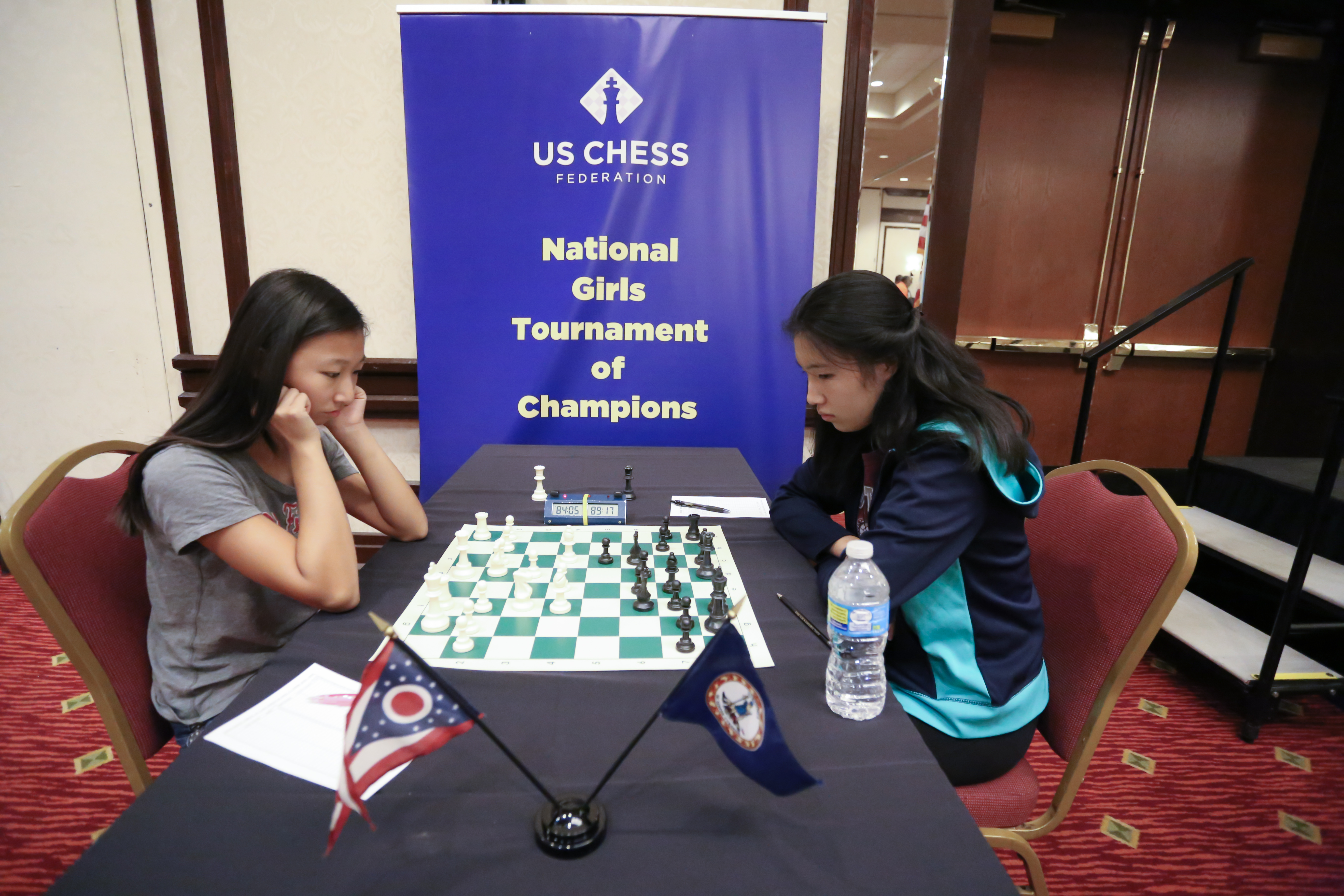 Denker Tournament of HS Champions, Photo Anne Buskirk
Denker Tournament of HS Champions, Photo Anne Buskirk
The following amazing game occurred in round 5 of the Denker tournament of high school champions in Indianapolis, Indiana. Mika Brattain (MA) found himself under serious pressure - with an exposed king and enemy attackers swarming into his ranks. With cool nerves (and a little fortune), Brattain not only held the position but exploited a few missed opportunities by Advait Patel (OK) to bring home the full point. This gives Brattain a half point lead going into the final day's play.
[pgn]
[Event "2016 US OPEN, DENKER, BARBER, NGTOC"]
[Site "Indianapolis, Indian"]
[Date "2016.07.31"]
[Round "3"]
[White "Patel, Advait"]
[Black "Brattain, Mika"]
[Result "0-1"]
[ECO "C62"]
[WhiteElo "2462"]
[BlackElo "2458"]
[Annotator "Karagianis,Pete"]
[PlyCount "102"]
[EventDate "2016.??.??"]
[Source "MonRoi"]
1. e4 e5 2. Nf3 Nc6 3. Bb5 Nge7 4. Nc3 d6 5. d4 Bd7 6. Be3 Ng6 7. Qd2 Be7 8.
O-O-O a6 {Following Lasker - Steinitz, from 1894. Yeah, no big deal. Just
treading along the path of a 122-year-old game.} 9. Be2 exd4 10. Nxd4 Nxd4 11.
Bxd4 {Lasker, here, recaptured with the queen. It only took 12 decades, or
just under a century and a quarter-century for someone to uncork this
novelty-- re-take with the bishop!} Bg5 {Logical - black wants to trade his
own bishop, which is limited by the d6 pawn, for the stronger piece on d4.
Also, as white has more space, trades seem generally favorable to black.} 12.
Be3 Bxe3 13. Qxe3 O-O 14. g4 Bc6 15. f4 Qh4 {Preventing the advance of the
h-pawn.} 16. Rdf1 h6 {Breaking a "rule." Typically, moving a pawn in front of
your king only creates a weakness.} (16... Rfe8) (16... b5 {Was also an idea
to try to start some action on the queenside.}) 17. Rhg1 Qf6 {Seemingly the
start of black's troubles. It's unclear what the queen accomplishes on f6. It
seems like it only puts itself in the way of the white attack- to ill effect.}
(17... Rfe8) (17... b5) 18. f5 Ne5 19. h4 {It's hard to imagine black can
survive this atack. It seems white has everything in his favor - his pieces
are ideally placed, his pawn strom has already arrived, his own king is tucked
safely away. It must have felt as if all he needed to do was play natural
moves...} g5 20. fxg6 Qxh4 21. g7 {! forceful. Drawing the king into the fire
of the white artillery. It is to black's credit that g7! is in fact the only
strong way to continue the attack. Other options would allow black to achieve
a defensive setup.} (21. gxf7+ Rxf7 22. Rf5 Bd7 {gets nowhere.}) 21... Kxg7 22.
g5 Ng6 23. Qd4+ Ne5 24. Qe3 (24. gxh6+ {It's likely white rejected this as he
was worried about black being able to hide behind the white h-pawn, but it's
not so simple. For example:} Kh8 25. Rh1 Qe7 26. h7 {Now white can shift to
the g-file.} b5 27. Rfg1) 24... Ng6 25. Qf3 {? But now white allows black a
chance that he should not have.} (25. Kb1 {Almost any move that doesn't allow
the defense f5 -- opening the f8 rook, closing some lines, and pinning --
would keep a noticeable edge. Kb1 takes away some potential queen trades on
the diagonal.}) 25... f5 {! Black simultaneously parries threats on the f-file
while also allowing his rooks to play a role in the game. This move must have
been difficult to play - simply because of the sheer amount of forcing
responses white has at his disposal which black must calculate. But, with
nerves of steel, Brattain finds the best continuation.} 26. Nd5 Bxd5 {A common
defensive resource - trades.} 27. Qc3+ Kg8 28. exd5 hxg5 {It's hard to believe
this position would arise after 19. h4.} 29. Qxc7 Qd4 30. Bd3 Qe5 31. Re1 Qf4+
32. Kb1 Rf7 {Black breathes his first sigh of relief, though with such an airy
king, his task is still not easy.} 33. Qb6 Raf8 (33... Nh4 {Was required.} 34.
Ref1 Nf3) 34. Rgf1 (34. Ref1 {! was the correct rook. The famous, "Decide
which rook you should move, then pick the other one."} Qh4 {The point is, the
queen is denied the critical g3 square.} 35. Qe3 {which allows white this
regrouping maneuver.} g4 36. Rh1 Qe7 37. Qh6 {...wherein the queen swings from
b6-h6.}) 34... Qg3 35. Re6 Rf6 36. b3 g4 37. Qxb7 Nf4 {I wonder if time played
an issue here, as both sides miss a critical sequence:} 38. Bc4 (38. Rxf6 {!!
White seizes control of the 8th rank and has winning tactics.} Rxf6 39. Qe7 Nh5
(39... Rf8 {The point is the rook cannot return because of Qg5!} 40. Qg5+) 40.
Qe8+ Kg7 41. Qxh5) 38... R6f7 {The serious danger has passed.} 39. Re7 Rxe7 40.
Qxe7 Ng6 41. Qe6+ Kg7 42. Bd3 Qe5 43. Qd7+ Rf7 44. Qd8 {Black has fully
consolidated and has all to play for.} g3 45. Qg5 Rf6 46. Rh1 Qf4 47. Qh5 g2
48. Rd1 Qg4 {Black forces the queens off, and the ending is won. A miraculous
effort. Despite (sometimes serious) mistakes on both sides, this exemplifies
the notion that chess is, at its essence, a fight.} 49. Qxg4 fxg4 50. Rg1 Nh4
51. Kc1 Rf2 0-1 [/pgn]
In the Barber tournament of K-8 Champions, Andrew Zheng and Brandon Jacobson are tied for the lead while in the National Girls tournament of Champions, Jennifer Yu has a full point lead.
 Jennifer Yu (VA) in round one, against Stella Huang. Photo Anne Buskirk
Jennifer Yu (VA) in round one, against Stella Huang. Photo Anne Buskirk
Follow
US Open results here and follow pairings of
Denker, Barber and NGTOC here.
 Denker Tournament of HS Champions, Photo Anne Buskirk
Denker Tournament of HS Champions, Photo Anne Buskirk  Jennifer Yu (VA) in round one, against Stella Huang. Photo Anne Buskirk
Jennifer Yu (VA) in round one, against Stella Huang. Photo Anne Buskirk 






